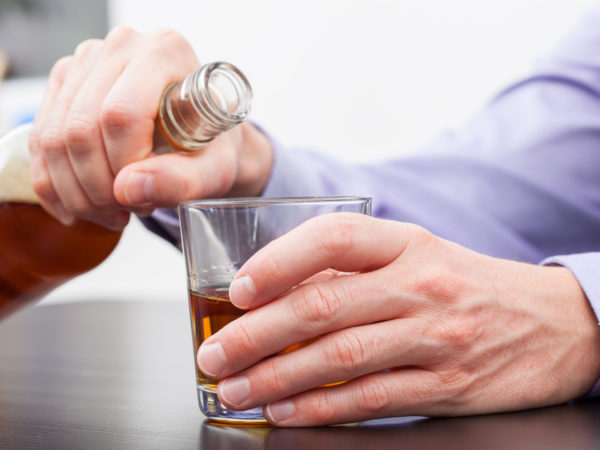Alcoholism

What is alcoholism?
Alcoholism is not a readily definable term. It usually refers to a person’s habitual and excessive drinking of alcoholic beverages, involves their many unsuccessful attempts to stop, and describes their continued drinking despite adverse consequences to health, responsibilities, and personal values.
Men are two to four times more likely than women to become alcoholics. The disease is divided into two categories: alcohol abuse and alcohol dependence. Alcohol abuse refers to the often hazardous overuse of alcohol. People who abuse alcohol tend to have problems with binge drinking (consuming six or more alcoholic drinks in one sitting), as well as engaging in risk-taking behavior such as drinking and driving.
Alcohol dependence is even more serious: People who are dependent on alcohol lack the ability to voluntarily cut down or stop drinking. They develop a physical tolerance, so that they require increasingly large amounts to become intoxicated. They also develop withdrawal symptoms, including rapid heartbeat, anxiety, and even seizures, when they drink less or stop drinking.
What are the symptoms of alcoholism?
The signs and symptoms of alcoholism are often individual but can include:
- Drinking alone or in secret
- Being unable to limit the amount of alcohol consumed in spite of desire or intentions to not drink, or to drink only a certain amount
- Feeling a compulsion to drink
- Insomnia
- Anxiety, depression, or irritability
- Frequent falls and bruises
- Blackouts (inability to remember what occurred while drinking)
In its later stages, alcoholism can contribute to medical conditions such as:
- Nerve damage
- Pancreatitis
- Cirrhosis
- Heart disease
- Seizures
- Confusion and hallucinations
- Malnutrition
- Ulcers
What are the causes of alcoholism?
Alcoholism reflects an inappropriate and ultimately harmful relationship with alcohol. Alcoholism can develop when repeated drinking alters the levels of brain chemicals that support a feeling of well-being, which can lead people to compulsively consume alcohol to restore positive emotions or avoid negative emotions. There is no known single cause of alcoholism, but several risk factors appear to play a role, including:
- Having an alcoholic parent
- Ongoing depression or anxiety (sometimes called “self-medicating” for depression)
- Desire for social acceptance
- Chronically high levels of stress
Who is likely to become alcoholic?
An estimated five to 10 percent of male drinkers and three to five percent of female drinkers are dependent on alcohol. People who consume more than 12 drinks a week (women) or 15 drinks a week (men) are more likely to become alcoholic. Men are more likely than women to be alcoholic, as are people who start drinking before age 16.
How is alcoholism diagnosed?
There is no one test that can medically diagnose alcoholism. Doctors can identify the physiologic signs of long-term alcohol abuse through a physical examination and blood tests. They may also ask the patient questions about his or her drinking habits, using a standardized questionnaire, to identify psychological signs. Since many alcoholics are in denial about their problem, doctors may ask the patient’s permission to speak with family and friends as well.
What is the conventional treatment for alcoholism?
Once the problem has been recognized, alcoholism is best addressed initially by total abstinence from alcohol, followed by assessment, treatment and resolution of the underlying triggers for seeking alcohol. Treatment includes the following.
- Detoxification.This stage typically takes four to seven days and should be done in a controlled setting (such as a rehabilitation facility), where medications are used to treat withdrawal symptoms. During detox, the doctor will evaluate and treat related psychological and physical problems, including depression, anxiety, and liver disease.
- Rehabilitation programs:Such programs can happen on an inpatient or outpatient basis and aim to support alcoholics after detox as they attempt to maintain abstinence. Rehab programs usually include individual or group counseling, education, and ongoing medical care.
- Support groups: Self-help groups such as Alcoholics Anonymous offer emotional support and provide role models and sponsors to alcoholics.
- Medications: While not magic bullets, some medications may be prescribed, in addition to other treatments, to help prevent relapses. Some, (such as Vivitrol) work by decreasing alcohol cravings, while others (such as Antabuse) trigger unpleasant side effects when alcohol is consumed.
What does Dr. Weil recommend for those who now drink alcohol?
There are infinite gradations between abstinence and alcoholism. An intermediate stage that is often considered benign is social drinking, in which the person is in no sense addicted – he or she uses alcohol infrequently, in moderation, and only in the company of others. Much further down the continuum are alcohol abuse and functional alcoholism, in which the person finds compulsive alcohol intake interfering or competing with home, work or school responsibilities, but retains some ability to set limits on frequency and quantity of drinking. Here is Dr. Weil’s advice for people in these intermediate states:
- The best way to protect yourself from the hazards of alcohol is not to use it every day. People who drink wine with dinner every night or have a beer every day or a mixed drink or two after work should give themselves two or three alcohol-free days a week.
- Do not rely on alcohol as your main method of relaxation. Learn to relax using your own resources through breath control, yoga, meditation, or another technique that you enjoy and find effective.
- Do not use alcohol at all if you have liver disease, urinary problems, prostate trouble, ulcers or other problems of the upper digestive tract (esophagus, stomach, duodenum), or any nervous or mental disease.
- Never drink alcohol on an empty stomach. It is highly irritating to the lining of that organ.
- Alcohol burns up B-vitamins, especially vitamin B-1 (thiamin). If you drink, take a B-complex vitamin supplement plus extra thiamin (100 mg) on days you use alcohol. This will help protect your nervous system and potentially avoid the nerve damage seen in alcoholics as the result of thiamin deficiency.
- Alcoholic beverages, which are exempted from labeling requirements, may contain harmful additives. Wines frequently have sulfite preservatives and other allergens that can precipitate attacks of asthma, migraine, and various allergic reactions. The best beers are made only from barley malt, water, yeast, and hops, but many beers on the market have dozens of other ingredients. Liqueurs may be dyed with artificial colors. Try to buy quality brands of alcoholic beverages that advertise the purity of their composition.
- Alcohol has calories. They behave like carbohydrate calories, but the body cannot store their energy. It must burn them immediately. As a result, the calories of food you eat at the same time will more readily end up as fat, because the body will tend to store them. If you are trying to lose weight, cutting out alcohol will make the job much easier.
- If you find you cannot control your use of alcohol, get help from Alcoholics Anonymous or a professional counselor who specializes in substance abuse.
What therapies does Dr. Weil recommend for alcoholism?
In addition to conventional treatments and complete abstinence, Dr. Weil recommends the following two supplements to people coping with alcohol dependence.
- B vitamins:Research suggests that alcoholic cravings are due to a deficiency in B vitamins and that supplements may lessen the desire to drink. But these findings, most of which are more than 20 years old, haven’t been substantiated over time. Still, because alcohol abuse does deplete B vitamins in general and thiamin in particular, consider taking a B-100 B-complex vitamin supplement, plus extra thiamin.
- L-glutamine: Research in both animals and humans suggests that this amino acid can reduce both cravings and the anxiety that accompanies alcohol withdrawal. The study in humans was done in 1957. Participants took either a placebo or one gram of L-glutamine in divided doses, with meals. Results were published in the Quarterly Journal of Studies on Alcohol.
- Milk thistle (Silybum marianum): Extract of the seeds of this flowering plant in the daisy family have been shown in European research to stimulate regeneration of liver cells and protect them from toxic injury. It is found in most health food stores as “milk thistle,” “silybum,” or “silymarin.” Take two capsules of an extract standardized to 70-80 percent silymarin) two or three times daily as the label directs. You can stay on it indefinitely.













